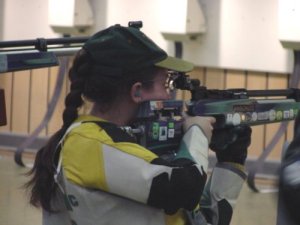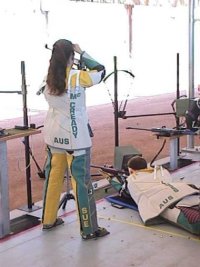INTERVIEW WITH SUE MCCREADY
Sue McCready is a multiple-times Australian Champion in Sport and Air Rifle, and represented Australia at the 2000 Sydney Olympics, as well as at the Athens Games in 2004 and Beijing in 2008. We spoke to her at the Munich airgun competition in 2001.
How long have you been shooting?
I’ve been shooting for almost 8 years, since I was 12.
Which club did you start with?
I started with the Eltham Rifle Club in Melbourne. I’m now with Melbourne International Shooting Club because the clubs merged together. We have a nice big range now and it’s much better.
When you first started did you just shoot air rifle?
No, I just shot prone for about two years and then I started shooting air rifle, and then about a year after that I started shooting 3P.
What brand of rifles do you use?
All Anschutz.
Do you batch test ammo?
Yes. Every time at the World Cups the manufacturers have testing, so we take our guns there and buy enough for the next year and then come back again.
What about 22?
The AIS in Canberra had a test machine, everything was set up and was really good, but now (after the Olympics) we’re back at home and have to fend for ourselves. It’s a bit harder when you don’t have all the equipment.
What type of 22 ammo have you been using?
Eley Tenex Gold.
What clothing do you wear?
Kurt Thune. I used second hand Anschutz gear in the past, and that was all right, but it wasn’t made to fit me. Then when I was getting new gear we were told to get Kurt Thune because it was the best.
So you were in the OAP? (Olympic Athlete Program)
Yes.
How long were you in that?
Since 1997.
Just for the sake of our overseas readers, the OAP was a live-in situation in Canberra, wasn’t it?
Yes. Initially from all disciplines there were about twelve athletes that started out there. But not everybody who was on the OAP lived in Canberra at the AIS (Australian Institute of Sport), some who were married and had families and didn’t want to live apart, so they stayed at home. So twelve started out the program, and by the end I think there were four left! It was pretty hard living there, it was a different kind of lifestyle compared with what we had all been used to. It was worth it though, it was a good experience.
Did you get to use all the AIS facilities, like weight training and swimming?
Yes, anything you wanted.
Who was your coach there?
Miroslav Sipek – he’s from Yugoslavia. He’s living in Melbourne now.
Have you just had a coach for the last three years?
Yes. He’s the only coach I’ve ever had. Before I started in the OAP, people offered to help and all that, but once you get to a certain level you need someone who’s been there and done it, not just someone who watched. It sounds terrible but it’s true.
What’s your favorite training routine?
It was good when we were in Canberra because we’d start training about nine and then pack up about twelve thirty or one o’clock, and then we had the afternoon to go to the gym, go for a swim or whatever you did, and that was a really good way of doing it.
Did you find that there was one particular drill that you though did you a lot of good, like dry fire?
I hate dry firing. I find just shooting matches, like controlled competitions, was best for me. You get a score as a result and that’s more satisfying than shooting groups. I like shooting competitions.
Although you hate dry fire, is it something your coach insisted on?
Not really, but we had to do it in maybe one training session a week. It wasn’t really a big thing we had to do.
But you never saw the benefit of it?
I can see the benefit but it’s boring.
How do you handle the mental game in a match?
I don’t really think of anything when I’m shooting a match. When you train and you shoot a ten, you know how to shoot a ten. That’s what you have to do in competition. I shoot fast and I don’t really think much at all.
So you think that by shooting faster.
Yes, it stops my mind from wandering to other things.
Do you use any mental training techniques, like visualization?
I’m not a big technical person, I just go out and shoot. I think if you think too much about it and go into it too deeply you get too many things to worry about and that’s just my feeling. If you put the work in you shouldn’t need to think about it. You know what you’re doing.
 Do you ever have anything like a song going through your head?
Do you ever have anything like a song going through your head?
Sometimes.
Any particular type of song or does it depend on the mood of the day?
It does depend on the mood of the day, but if I’ve got a song in my head it’s good, I can get into a rhythm and just shoot, and not think too much about what I’m doing.
What’s your funniest shooting experience?
I haven’t had much really, I forgot to put my bolt in my 22 a couple of times. One time we were going from Germany into the Czech Republic, we were going by train. We went over the border and they came to check our passports and visas and everything, and some of our paperwork was wrong so they just stopped the train in the middle of nowhere and chucked us off. They left us there and they sent the police, they told us the police were going to come and get us and take us back to the border. That was the funniest thing. They stopped the train and threw all us little juniors off.
You had Vladimir looking after you.
Oh yes, we had a coach. But it wasn’t funny at the time. Do you know Kim Frazer?
Yes.
We were watching her shoot once and a rat ran up her leg during the Final. Not up her pants but on the outside. That would have been pretty bad, I wouldn’t want that to happen to me.
What advice would you give to a junior or a new shooter just starting out?
To keep at it, because nothing happens overnight. You just have to keep trying, trying and trying.
I remember you coming out to our range in Brisbane, it must be four years ago. I don’t know exactly how you were shooting at that stage, but it seems you have come a long way since then.
I think it was because when the OAP got set up and, Australian shooters, we had the opportunity to train properly and have a good coach. We started to come away and take part in a lot of competitions, and we got to meet a lot of other people from around here, all the good shooters. I think all those things helped everybody so much.
How many hours per week do you think you were training at the AIS?
Maybe sixteen or seventeen hours per week in actual shooting, then I’d run about an hour a day as well. I don’t think shooters need to be big and muscley, just fit enough in endurance.
Are you going to try for the next Olympics?
Yes I am. I’ll be there.
